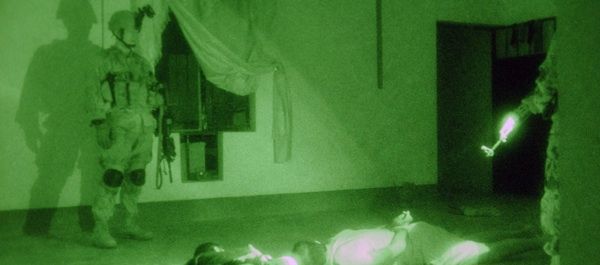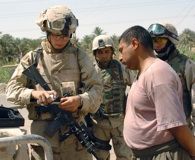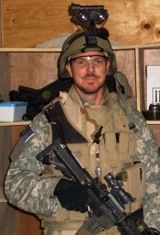‘Kill or Capture’ – Interview with Interrogator and Author Matthew Alexander

Between the Air Force and the Air Force Reserves, Matthew Alexander has served in the U.S. military for nearly 20 years and completed five combat deployments to three wars—Bosnia, Kosovo and Iraq—as well as operations in Colombia. He was a special operations helicopter pilot before becoming a special agent for the Air Force Office of Special Investigations.
 In 2006, at the request of the U.S. Army, he deployed to Iraq as an interrogator. There, he conducted more than 300 interrogations and supervised more than 1,000. He led the interrogation team that located Abu Musab al-Zarqawi, leader of al Qaeda in Iraq and, at the time, a higher-priority target than Osama bin Laden. That story was told in How to Break a Terrorist: The U.S. Interrogators Who Used Brains, Not Brutality, to Take Down the Deadliest Man in iraq, by Matthew Alexander and John Bruning.
In 2006, at the request of the U.S. Army, he deployed to Iraq as an interrogator. There, he conducted more than 300 interrogations and supervised more than 1,000. He led the interrogation team that located Abu Musab al-Zarqawi, leader of al Qaeda in Iraq and, at the time, a higher-priority target than Osama bin Laden. That story was told in How to Break a Terrorist: The U.S. Interrogators Who Used Brains, Not Brutality, to Take Down the Deadliest Man in iraq, by Matthew Alexander and John Bruning.
Earlier this year, St. Martin’s Press published his memoir Kill or Capture: How a Special Operations Task Force Took Down a Notorious al Qaeda Terrorist. Following the recent special operation that eliminated Osama bin Laden and netted what is being described as a treasure trove of intelligence information, this seemed like a good time for Armchair General to talk with Matthew Alexander.
ArmchairGeneral.com: How did you become an interrogator? What drew you to that field?
Matthew Alexander: I was a special agent for the Air Force so I was already versed in criminal interrogations and at the same time as a Reservist I kept volunteering to go to Afghanistan or Iraq. The Army ran short of interrogators so they called the Air Force and the Air Force called me. I jumped on the opportunity. It sounded challenging and I’ve always enjoyed interrogations. We didn’t find out which country we were going to until several days before we deployed. I had read a few books on Afghanistan so I had to quickly change gears and read up on Iraq.
This war can never be won by stopping terrorist attacks. AQ can only be defeated by eliminating their ability to recruit.
ACG: Kill or Capture tells the story of a succession of raids and interrogations as you and the rest of the team worked your way up the al Qaeda chain of command. Can you summarize for our readers how a raid would go down?
{default}MA: I can’t give away the tactical details for obvious reason, but the basic premise that I outlined in my book is that the team surrounds a house, which includes snipers, and then they blow the front door off the hinges and conduct house clearing procedures, also known as Close Quarters Combat (CQC). It all takes place in about two minutes. The soldiers flex-cuff all the adult aged males in the house and separate them from the women and children. Then they call the interrogators and we come in and start asking questions. Of course, that’s the ideal situation. Unfortunately, sometimes men would run out of target houses right before the raid and jump walls and/or run into other houses. There’s always the fog of war that can intrude on the best-laid plans.
ACG: Can you tell us a bit about your work in tracking down Musab al-Zarqawi?
MA: In summary, my team interrogated several high-ranking members of Al Qaeda and convinced each of them in turn to provide the location or a means of locating their boss. In this way, we worked our way up the ladder of AQ’s hierarchy in Iraq. Sometimes those trails led sideways. In the end, we captured five senior members of AQ in a farmhouse outside Baghdad preparing suicide bombers for missions. One of those men proved to be the key to finding Zarqawi. He was the Hannibal Lector of Al Qaeda, similar in stature and personality to the Anthony Hopkins character in Silence of the Lambs. He originally wouldn’t talk because other interrogators didn’t show him the proper respect and used interrogations methods based on fear and control. In six hours, I was able to get him to cooperate for the first time. Even after that, internal conflicts in our unit almost cost us the opportunity to find Zarqawi, but luckily my plan played out. If you want to know how I was able to convince this detainee to cooperate or the plan I used, you have to read the book!
 ACG: In point-of-contact interrogations in Iraq, you had to obtain information quickly because if the team lingered in the area of capture too long insurgents might organize an attack against them. How did you manage to convince your subjects to give up useful information short order?
ACG: In point-of-contact interrogations in Iraq, you had to obtain information quickly because if the team lingered in the area of capture too long insurgents might organize an attack against them. How did you manage to convince your subjects to give up useful information short order?
MA: Usually we had only 10 to 15 minutes to get information. Sometimes we might only get a small clue while in the field and then have to expand on that when we got back to the base and conducted followup interrogations. Usually the best methods for getting information quickly in the field are based on law enforcement methods such as Prisoner’s Dilemma, where you use information from one detainee against another. Or you can insert false information to confuse detainees or to detect deception. You can also use family members to help in your interrogation, something you can’t do once you return from the field. Most of the law enforcement methods are based on deception. Back at the base, with more time, we used rapport building techniques—getting to know detainees, what motivated them, and then using that to craft a proper interrogation approach and offer an incentive (tangible or intangible).
ACG: So interrogators have to think on their feet and rapidly adapt to situations just as troops have to in combat but in a different manner?
MA: Exactly. Every single point-of-capture interrogation is unique. You never know what you are going to find in the field. Sometimes you have very helpful evidence, such as the case in Kill or Capture when we caught an Al Qaeda weapons dealer and were pulling guns and bombs out of every possible nook and cranny in his house. Other times you have absolutely nothing to go on—no evidence, no names, no relationships, and you just have to get very creative with your approach methods in being able to build a puzzle without the first piece in place. This might mean, as I referred to before, using deception. It might also just mean treating somebody with respect which throws them off their game because they do not expect it. They expect us to get in their face and yell and even to abuse them. But when you don’t do that, then the advantage of the shock of capture starts to help you versus the fear that they have naturally, which works against you.
ACG: Kill or Capture is the story of how you and the team you were working with in Iraq tracked down a Syrian mass murderer known as Zafar, the leader of al Qaeda in northern Iraq. At one point you had his deputy in custody and let him go to help you find Zafar. Can you describe what you thought and felt when you learned that your mole had slipped through your fingers?
MA: It was discouraging. We all realized it was a big risk to use a detainee as a mole. When he ran, we knew that we had added just one more layer of the AQ hierarchy to our chase and it might have a cost in lives. But one thing we have to learn to do more of as interrogators is be willing to take chances. The ultimate goal of every interrogation is full-complicity that results in a source. We don’t do that enough. We have to be willing to risk losing a few people for the bigger gain of killing or capturing the top tier of AQ.
ACG: In the book and in your testimony before a Senate Judiciary Committee you said that although the interrogation techniques listed in the Army Field Manual 2-22.3 are valid and sometimes applicable for interrogating members of al Qaeda, they were written for use on rank-and-file soldiers of the Cold War. How does interrogating terrorists like those in al Qaeda differ from interrogating regular army soldiers?
MA: First, they are organized differently. AQ is organized like Facebook—it’s all social networking. One member of AQ can have several roles: foot soldier, financier, courier, recruiter, etc. This is unlike an organized army where soldiers have positions and duties such as logistics, cavalry, scout, infantry, etc. It’s vital that we understand this difference. I think the interrogators early on in Afghanistan didn’t understand this concept.
The second difference is the culture. AQ as an organization has a unique culture because the majority of its members are Arab and all of them are Muslim. An interrogator must become as familiar as possible with the culture of the detainees to be successful. AQ’s culture shares some traits with traditional armies, such as an emphasis on loyalty, discipline, and sacrifice. They also have a similar idea about the prestige of combat. But there are also different values, such as the fact that some AQ members become suicide bombers. They also swear bayat (loyalty) to a person, not a nation (that person was Osama bin Laden). These are all themes that an interrogator can use to tailor interrogation approaches.
ACG: Reports that said the initial information that ultimately led us to Osama bin Laden was obtained by what is termed "enhanced interrogation techniques" has revived the debate about the use of torture to obtain information. In Kill or Capture you wrote, "The argument that the supporters of torture make is that torture and abuse are necessary to save lives. That is a lie." Would you like to talk about why you say that?
Regardless of whether or not torture works, it’s immoral and goes against American principles.
MA: First, the evidence that is now coming out is pretty clear that torture and abuse slowed down the hunt for bin Laden. Khalid Sheikh Muhammad lied to his interrogators about the courier’s name and tried to mislead them about his whereabouts. They didn’t need to torture him so that they could recognize this lie. That actually only made it more difficult to discern if he was lying. Instead, there are many law enforcement methods based on deception that can be used to test the same information.
When addressing the torture issue I like to ask a few questions. First, why would anyone think that American interrogators are not smart enough to outwit Al Qaeda terrorists? We have and will continue to do so. Secondly, how did we get through World War II without torture and abuse against very similar enemies? Remember, the Japanese even had suicide bombers. Again, we did it with our brains and our other secret interrogation weapon against our enemies—compassion. Thirdly, a point you’ll never hear torture supporters address is the long-term negative consequences, which are many. For example, as I heard in Iraq overseeing the interrogations of foreign fighters, the fact that we used torture and abuse became AQ’s number one recruiting tool. The resulted in hundreds or thousands of foreign fighters flooding into Iraq and then killing hundreds, perhaps thousands, of American soldiers. So the policy resulted in the deaths of Americans. Also, it made other detainees more resistant from the start of an interrogation because they saw every interrogator as a torturer. In addition, it will make Americans in future wars subject to the same tactics, even from other countries that have signed the Geneva Conventions, and they will need only to use our same rationale that it saves lives—which it doesn’t)
Lastly, let me say that regardless of whether or not torture works, it’s immoral and goes against American principles. George Washington said as much during the Revolutionary War and forbid his soldiers from torturing prisoners. There are other weapons of war that work almost 100 percent of the time that we don’t use, such as chemical weapons and flamethrower). So it’s the moral argument that matters—as well as the fact that it’s unlawful.
ACG: In the book you tell the story of a female Iraqi television reporter and her cameraman who were kidnapped and filmed being tortured with power tools before being beheaded. As you put it, "When you read a report like this one, however, it draws out a beast deep inside you … You understand how it spins out of control." Have there been times during interrogations when you really had to fight to keep a chain on that beast within?
 MA: I think almost every interrogator feels that rage and anger within at some point. It’s hard not to when you are interrogating men that you know committed atrocious acts, like the one described above. Plus there’s a lot of pressure to get results quickly. Lives are at stake. The responsibility of soldiers, however, is to put their emotions aside and perform their duty. That’s called emotional intelligence.
MA: I think almost every interrogator feels that rage and anger within at some point. It’s hard not to when you are interrogating men that you know committed atrocious acts, like the one described above. Plus there’s a lot of pressure to get results quickly. Lives are at stake. The responsibility of soldiers, however, is to put their emotions aside and perform their duty. That’s called emotional intelligence.
ACG: You wrote that al Qaeda’s brutality, especially toward some of its own fighters, led former members of the organization to turn against it and, in fact, that some of best sources of information in Iraq were former al Qaeda religious leaders. Do you see the same thing happening in Afghanistan and Pakistan?
MA: I’m not an expert on either of those countries, but I do think that AQ’s own hypocrisy works against them as an organization. What’s important to understand is that this war can never be won by stopping terrorist attacks. AQ can only be defeated by eliminating their ability to recruit. That’s when they will decline as an organization. Their own violence and betrayal of the values they claim to uphold works against them in that respect, especially their murder of other Muslims. I believe members of AQ are not Muslims. It’s like calling David Koresh or Timothy McVeigh Christians. Just claiming to be part of a faith does not make one so.
In Afghanistan and Pakistan I think these same rules apply. Eventually, I think moderates will win out one way or the other because violent extremism is not sustainable. People will always eventually reject oppression and hypocrisy. We shouldn’t forget that the Taliban never ruled all of Afghanistan even before 9/11, so obviously many Afghans, even those living under Taliban rule, had already rejected their fundamental beliefs. AQ is fundamentally flawed as an organization because of their ideology.
ACG: Thanks for talking with us, and thanks for your long service to America. Is there anything you’d like to add in closing?
MA: One fact I’d like all Americans to remember is this: our interrogators have repeatedly excelled in armed conflict. World War II interrogators played a vital role in our winning, and other military interrogators had similar successes in Vietnam, Panama, and the First Gulf War. Saddam Hussein was caught by an ingenious Army interrogator named Eric Maddox. My team located Abu Musab al-Zarqawi. Time and time again American interrogators have achieved great success. Always without torture. We should put complete faith in them. They can do their jobs without sacrificing their principles. They might not win every "battle," but I guarantee they can win the war.
Gerald D. Swick is senior online editor for the Weider History Group’s Websites ArmchairGeneral.com, HistoryNet.com and GreatHistory.com.


Great to hear such a passionate argument against use of torture from one “in the trade”. Well done Matthew.